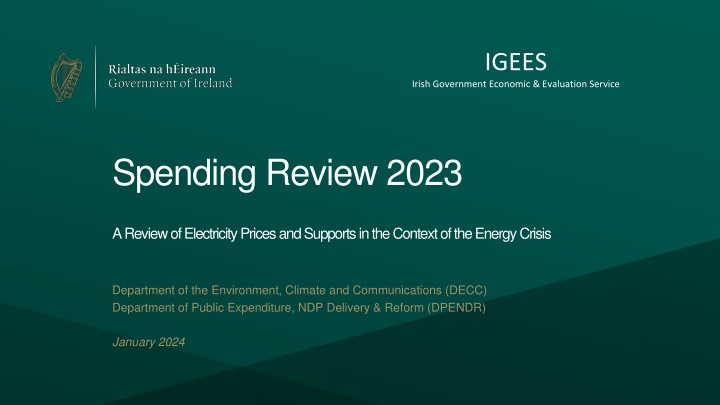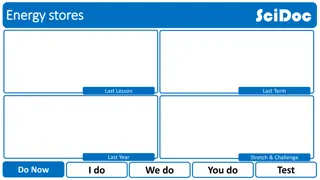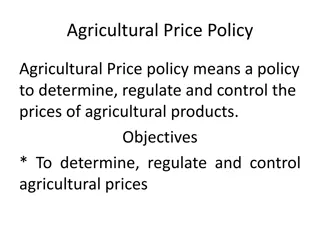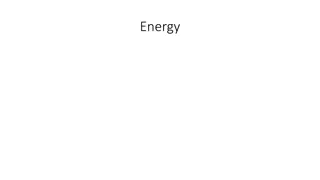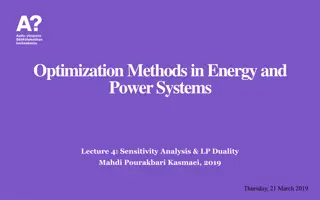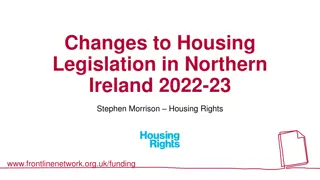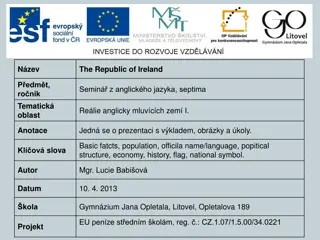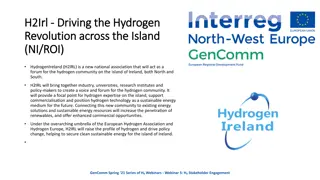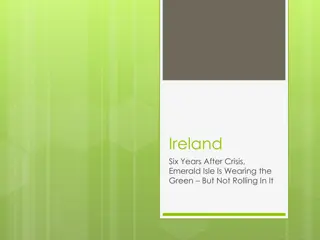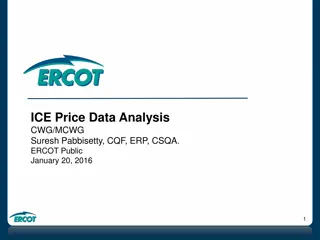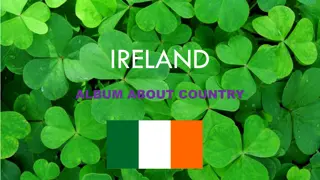Analysis of Government Interventions on Energy Prices in Ireland
Household energy prices in Ireland have risen sharply due to increases in Energy and Supply costs, primarily driven by higher wholesale gas prices. Government interventions, including electricity credits and VAT rate reduction, have helped mitigate the impact on households, although concerns remain about energy bill arrears and welfare implications. The analysis aims to inform future energy support policies based on the findings from the Spending Review of 2023.
Download Presentation

Please find below an Image/Link to download the presentation.
The content on the website is provided AS IS for your information and personal use only. It may not be sold, licensed, or shared on other websites without obtaining consent from the author.If you encounter any issues during the download, it is possible that the publisher has removed the file from their server.
You are allowed to download the files provided on this website for personal or commercial use, subject to the condition that they are used lawfully. All files are the property of their respective owners.
The content on the website is provided AS IS for your information and personal use only. It may not be sold, licensed, or shared on other websites without obtaining consent from the author.
E N D
Presentation Transcript
IGEES Irish Government Economic & Evaluation Service Spending Review 2023 A Review of Electricity Prices and Supports in the Context of the Energy Crisis Department of the Environment, Climate and Communications (DECC) Department of Public Expenditure, NDP Delivery & Reform (DPENDR) January 2024
Spending Review 2023 Overview, Aims & Objectives Overview Over the previous two years, households and businesses across Europe have experienced significant increases in the cost of energy. The price of gas has risen steeply since the latter half of 2021 to reach unprecedented levels, driven by the rebound in global economic activity and the conflict in Ukraine. Consequently, Irish households and businesses have seen the cost of their energy bills increase steeply over this time period To insulate Irish households from the impact of increasing energy costs, in Spring 2022 the Government put in place a range of measures to address the cost of living specifically targeted at energy price increases. The Cost-of-Living package agreed as part of Budget 2023 provided three further energy credits worth a total of 600, in addition to the 200 credit already paid in Spring 2022. These payments were provided under the Electricity Costs Emergency Benefit Payment Scheme. While wholesale gas prices have fallen dramatically subsequently and are now well below the peak values of last year, they remain approximately double their pre-pandemic levels and these elevated retail prices were expected to continue throughout Winter 2023/24, even with the price reductions announced for Q4-2023. Aims and Objectives This analysis sought to provide policy makers with a better understanding of the relationship between wholesale energy prices and household bills, and the extent to which Government interventions mitigated the impact of energy price increases on households since the onset of the energy crisis. This paper was undertaken as part of the IGEES 2023 Spending Review process in the run up to Budget 2024. The objective of this work was to assess the need for additional Government intervention over winter 2023/2024 and to help inform the design of any future energy supports. 2 Rialtas na h ireann | Government of Ireland
Spending Review 2023 Results and Conclusions Household energy prices have increased steeply particularly in 2022 mostly due to increases in Energy and Supply cost, which was in large part due to an increase in wholesale gas prices. This analysis finds that, in the absence of Government intervention, an illustrative household (taking account of changes in demand) would have experienced an increase of 51% in the cost of their electricity bill between 2017 and 2022, with a 24% increase between 2021 and 2022. For this illustrative household, the two electricity credits received in 2022 and the VAT rate reduction resulted in a c. 12% decrease in the electricity bill in 2022 when compared with 2021, rather than the 24% increase that would have been experienced without supports. For this household, these two Government measures covered 29% of the total electricity bill and 18% of the total energy cost of 2022,. In 2022, households generally reduced their energy consumption in comparison to previous years. While this may represent some households using energy more efficiently and the effects of a milder winter, household surveys indicated that over this time a significant number of households felt cold in their own home as they saved on energy bills. This raises significant welfare concerns. While the electricity credits assisted approx. 211,000 instances of electricity customers escaping from arrears across the four payments, overall there was an increasing volume of people in arrears on energy bills, specifically gas customers and those in long-term arrears on their electricity bills, both of which continued to rise throughout the period in which the electricity credits were applied. While the goal of the Electricity Costs Emergency Benefit Payment was to mitigate the impact of the recent crisis, it is clear that addressing customers in long-term arrears and gas customers in arrears will require more targeted policy interventions. As part of its Energy Poverty Action Plan, published in December 2022, the Department of Environment, Climate and Communications is committed to exploring key longer-term measures to ensure that those least able to afford increased energy costs are supported and protected. 3 Rialtas na h ireann | Government of Ireland
Spending Review 2023 Results and Conclusions While the COVID-19 moratoria make it difficult to gauge the impact of the electricity credits on disconnections, it appears that the electricity credits functioned well for those facing immediate risk of disconnection, rather than longer term risk. At its peak (August 2022) wholesale natural gas prices had increased by 706% and wholesale electricity prices had increased by 392% since January 2021. In comparison, consumer prices started to rise slightly later and by a significant but relatively more modest amount. As its peak, starting from October 2022, consumer gas and electricity prices increased by 138% and 98% respectively since January 2021. Since the latter half of 2021, the 12 and 18 Monthly Moving Averages (MMA) wholesale gas prices have risen much less steeply and to a lesser extent than the month ahead wholesale gas price. This indicates that energy suppliers, and in turn consumers were partially sheltered from the full extent of the initial steep wholesale gas price rises in 2021. Furthermore, even as wholesale prices increased further and persisted at exceptionally high levels throughout 2022, while retail prices increased quite substantially, the same level of price increases did not occur for retail prices. This suggests that energy suppliers did not pass on the full scale of the wholesale price increases to consumers. Despite the drop in wholesale gas spot prices in early 2023, it was expected that significantly elevated relative to more normal periods over winter 2023/2024. This was due to continuing high wholesale gas futures over the winter 2023/24 period and the lagged nature of the pass-through to retail prices. This suggested that additional support for energy bills was still required for households in winter 2023/2024, albeit to a lesser extent than in winter 2022/2023. This prompted the announcement of three 150 credits in Budget 2024. energy bills, while lower than peak 2022 levels, would remain In-line with this analysis, announcements by retail energy suppliers in Autumn 2023 indicated that household estimated annual bills (CRU EAB measure) have been reduced by around 8% to c. 2,000 for electricity and by around 16% to c. 1,600 for gas from near the end of 2023. The timing of these price reductions is in-line with the analysis provided in this paper illustrating how the hedging strategies of energy suppliers explains the time-lag between the earlier fall in wholesale gas prices in 2023 and the pass-through to retail prices. 4 Rialtas na h ireann | Government of Ireland
